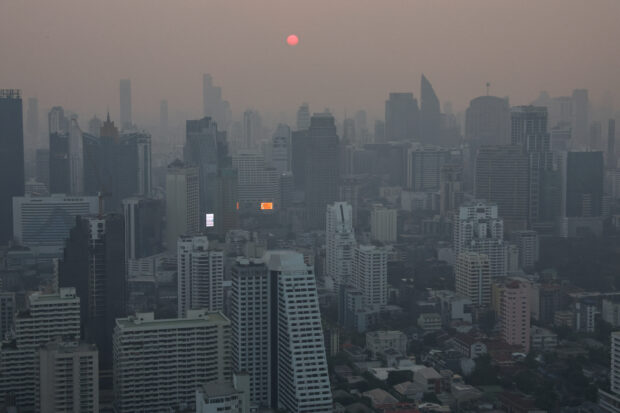Thailand warns of high pollution in capital, officials to work from home

A view of the city amid air pollution during sunrise in Bangkok, Thailand, February 15, 2024. REUTERS
BANGKOK — Thai authorities warned that pollution levels in Bangkok and surrounding provinces had hit unhealthy levels on Thursday, ordering government employees in the capital to work from home for the next two days and urging others to do the same.
Air pollution is caused by a combination of crop-related burning, industrial pollution and heavy traffic, and a smoky haze covered the Bangkok’s skyline.
Prime Minister Srettha Thavisin told reporters that crop burning was the main culprit behind the spike, but added that around quarter of the pollution was from vehicles, a factor “we can control”.
READ: Nearly 200,000 people admitted to hospitals as Bangkok chokes on pollution
Swiss air quality tracking website IQAir said the level of fine inhalable particles in the city was 15 times higher than the recommended level by the World Health Organization, making it the world’s 8th most polluted city on Thursday.
“It’s getting worse because there’s too much smoke haze,” said motorcycle taxi driver Kornpong Poprakun, 57. “I feel itchy eyes because there’s a lot of dust, and breathing isn’t easy.”
In a bid to curb traffic pollution, Bangkok Governor Chadchart Sittipunt told staff at the Metropolitan Administration’s agencies to work from home and said other employees should also do the same.
READ: Thick haze blankets Bangkok as air pollution hits unhealthy levels
He said some areas of the city had high levels of pollution and authorities were ready to manage the situation.
The government has offered subsidies to farmers to prevent burning and packages for cheaper electric vehicles while Thai lawmakers are considering a clean air act for transport, business and agriculture to reduce pollution on a wider scale.
Srettha said the government should consider limiting vehicles powered by fossil fuels in the capital to limit pollution in the long term, adding that the country’s EV policy was also key.